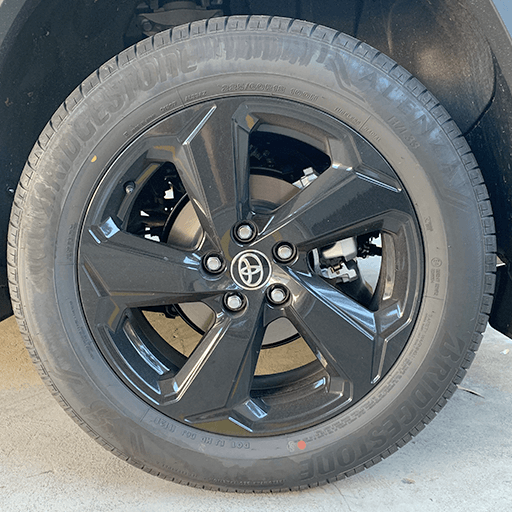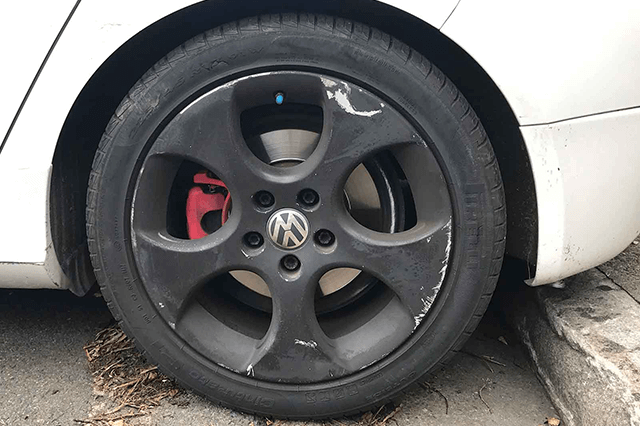How much does alloy wheel repair cost?
Article by Matilda Douglas-Henry
Alloy wheels are a pragmatic and aesthetic feature of any vehicle, and have become the go-to wheel option for most cars. As the name suggests, alloy wheels are made from a variety of different metals (typically aluminium and magnesium) and other materials, unlike your garden-variety steel wheel. Alloy wheels have a clean, slick shine and are lightweight, allowing them to put less pressure on the suspension and make for a smoother ride*. Given the ubiquity of alloy wheels, it’s more important than ever to know the factors that affect the cost of alloy wheel repair, as well as the different types of repairs technicians may need to perform; and DingGo is here to help. In this article we’ll look at:
1. The different types of alloy wheels
2. What sorts of repairs your alloy wheels might need
3. How much alloy wheel repair costs
What are the different types of alloy wheels?
Like all car parts, alloy wheels come in a variety of different sizes, makes, and models. Not only do wheel types have distinct looks, but they also impact petrol use differently and have varying levels of durability. We also recommend familiarising yourself with the type of alloy wheels on your vehicle in order to assess the cost of possible repairs down the line.
Broadly speaking, there are two types of alloy wheels: forged and cast. Forged wheels are made from a single block of metal that has been shaped and pressurised. They are the more expensive option, being lighter and stronger than cast wheels. Cast wheels are formed by liquid metal being poured into a mold. As a consequence of this method, pores can appear in the metal that can lead to cracks; but this only becomes a problem in more extreme driving situations like performance driving, where the high amount of heat placed on the wheels can create cracks. Overall, cast wheels are cheaper and pose very few risks for everyday driving.
Beyond the different processes of actually making alloy wheels, there are other factors that influence cost and repair, like the finish. While the finish on your wheels may seem like an aesthetic choice more than anything else, exposed metal corrodes at a rapid rate, so some sort of finish is essential. Chrome plating is a classic choice, but any sort of scratch can have an oxidising effect and needs to be dealt with quickly. Chrome finish repairs also have a higher price tag because of the negative impact chromium has on the environment.
Powder coating is a durable finish that is less common, but creates opportunity for individual flair: a professional technician can apply bright colours to your rims that will rarely require touch-ups. Clear coating showcases the simple elegance of the bare metal without the concern of corrosion.

An example of painted wheels that would need to be repaired and then repainted adding to the overall repair cost.
What sort of repairs could my alloy wheels need?
Your alloy wheels might require many different types of repairs; if the damage is too severe, there is a chance that your wheels might need to be replaced instead.
The first thing you want to do is inspect your wheel thoroughly to assess the damage. When rims are damaged they bend, and often do so first around the outer edge. The basic rule of thumb is that, if your rim is bent but remains level to the centre section, it is repairable. If the damage isn’t level to the centre there’s a high chance that the entire wheel has buckled, which requires replacement.
The most common types of alloy wheel damage occur from kerbing a wheel, which realistically is something almost all drivers encounter at least once. If your wheel makes minimal contact with the curb, the alloy finish will become scuffed and scratched. This can be easily fixed by applying filler, primer and lacquer to the impacted area. More extensive kerbing can lead to graver damage to your rims.
Potholes are another unfortunate cause of wheel damage that often come out of nowhere, giving the driver a nasty shock as well as bending the afflicted wheel out of alignment. A deep pothole can leave a wheel beyond repair; even damage that seems less severe can have dire consequences, possibly creating a slow air leak that can go undetected for long periods of time.
When the damage to your alloy wheels is greater than a basic filler and sanding job, a technician will steep the wheel in a chemical bath that exposes the bare alloy, checking for cracks before it is washed and primed. Then the wheel is painted and baked at a high temperature, but not too hot to ensure the alloy structure remains intact*.

Pictured is an example of gutter rash where the alloy wheel as been damaged by a curb or gutter.
How much does alloy wheel repair cost?
Considering the vast spectrum of possible damage and subsequent repairs, alloy wheel repair costs can vary from reasonably cheap to very costly.
While the extent of the damage is the main consideration, your finish will also play a part in the final quote given to you by a technician.
If there is minor damage to your wheel it can cost as little as $100. A standard window for minor alloy wheel repairs in Australia is approximately $99 to $220.
A replacement genuine wheel, however, could cost anywhere between $600 and $3,000*.
Conclusion
Use DingGo’s quick quotes service to help you find the best technician for your alloy wheel repair needs. Especially with something like alloy repair, the costs can vary greatly depending on who you talk to; a mobile service, for example, will cost significantly less than a standard automotive workshop. Don’t forget that we’re here to do the hard work for you.
